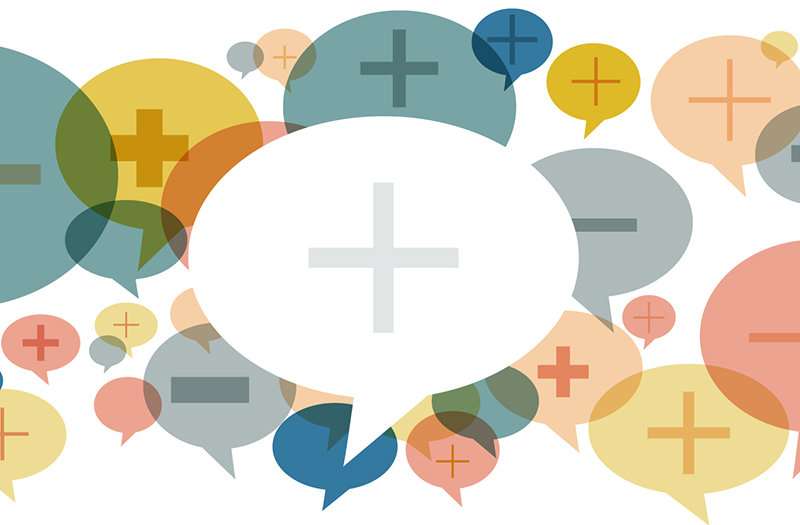Positive language is on the decline in the United States, study finds

Although recent election coverage may suggest otherwise, research shows that people are more likely to use positive words than negative words on the whole in their communications. Behavioral scientists have extensively documented this phenomenon, known as language positivity bias (LPB), in a number of different languages. However, a new study conducted by researchers at USC Dornsife and the University of Michigan, suggests that our tendency to use positive language has been on the decline in the United States over the past 200 years.
While LPB is well-established, there has been little consensus on what mechanisms are responsible for the effect. Previous studies, which looked at language as static, have proposed that LPB is due to subjective moods, objective circumstances or social influences.
But in a study published on Nov. 21 in the Proceedings of the National Academy of Sciences, researchers took a new approach to measuring LPB by looking at the fluctuation of the ratio of positive words to negative words used over time in American English.
"We already know that language is a very important mirror of our psychological state," said Assistant Professor of Psychology and Computer Science Morteza Dehghani, who collaborated with researchers Rumen Iliev and Robert Axelrod at the University of Michigan on the study. Dehghani runs the Computational Social Science Laboratory at USC Dornsife. "Since the time of Freud we've known that various psychology traits are captured in language. We also know that people generally tend to use more positive words than negative words. In this work we look at this phenomenon of language positivity bias over time to see whether it's a static occurrence or if it's dynamic and correlates with social and cultural issues that reflect themselves in language."
To conduct the study, the researchers analyzed writing published over the past two centuries in the corpora of Google Books and The New York Times. They calculated the ratio of the presence of positive to negative words that appeared. Their computations found that LPB has waned significantly.
"The finding itself is interesting because people have used LPB as an indirect measure of happiness in society," Dehghani said. "Further, there are various social psychology research findings that show that the mere exposure to positive words or negative words can change your mood. Also, depending on our mood, we tend to use more positive or negative words. So very generally, this is an indicator that happiness may be on the decline in the U.S."
To see if external factors might have an impact on the fluctuations, the researchers also compared their findings with objective circumstances including casualties of war, economic well-being via Okun's Misery Index, which measures unemployment and inflation rates, and subjective happiness indicators.
They found that LPB changes could be predicted in the objective environment and by changes in national subjective happiness and misery.
"Given that the measure of language positivity bias correlates strongly with subjective measures of happiness, the Misery Index—which is a measure of economic wellbeing—and also with the number of casualties in wars provides further evidence that the ratio we've captured between the use of positive words and negative words is showing something meaningful about the psychological states of society as a whole during the past 200 years," Dehghani said.
The findings also reinforce that previous theoretical frameworks for explaining the phenomenon of LPB were insufficient on their own.
"By studying shifts in LPB over time and looking at extant historical data, we were able to tease out strong evidence for multiple factors contributing to LPB," explained psychology doctoral candidate Joseph Hoover, who was also an author on the paper. "It really reinforces that we need to integrate multiple factors into our analyses."
Dehghani additionally noted that the study also demonstrates the value of newly available data sources to address long-standing scientific questions.
"In addition to showing that it's important to look at language as a dynamic feature of human psychology, we're also showing that techniques from computer science—the big data of psychology—can have many important applications in studying and verifying long-standing theories about human psychology, and about social sciences more generally."
More information: Linguistic positivity in historical texts reflects dynamic environmental and psychological factors, www.pnas.org/cgi/doi/10.1073/pnas.1612058113
Journal information: Proceedings of the National Academy of Sciences
Provided by University of Southern California



















